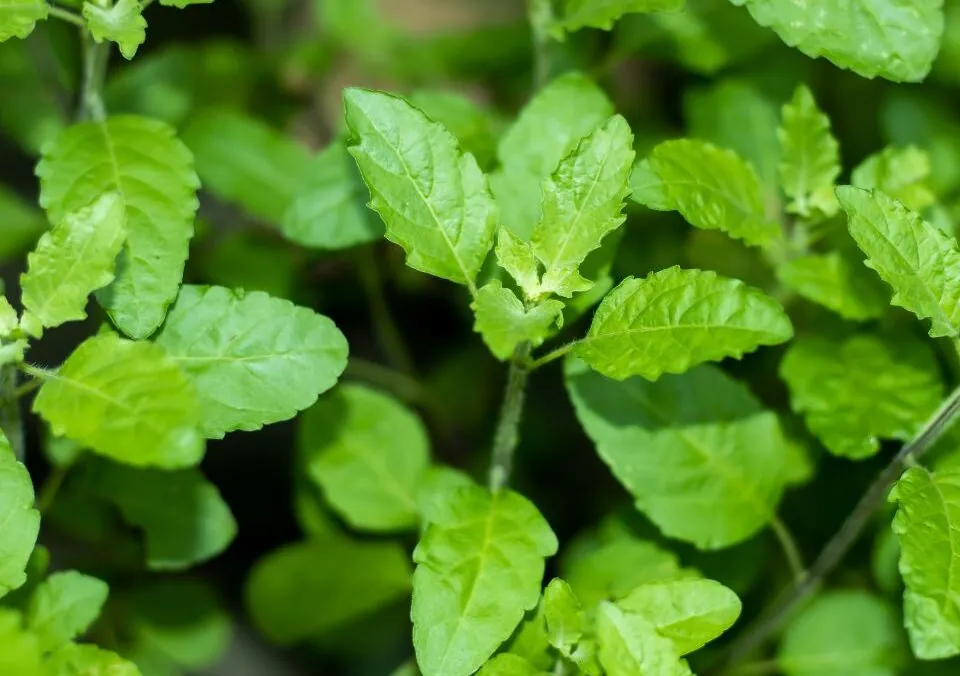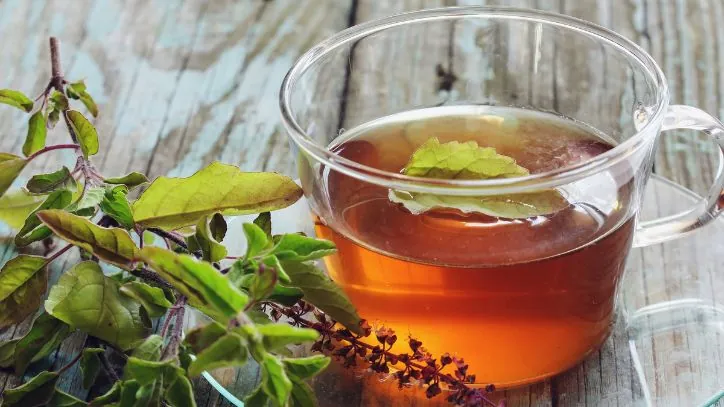Blog
Tulsi: Basil’s Healthful Cousin

When you think of basil, you probably picture its delightful flavor enhancing Italian dishes like pasta, pizza, and pesto, or paired as a garnish on various foods. However, one often-overlooked aspect of basil is its medicinal benefits. Tulsi, also known as holy basil, is a distinctive variety of basil that originates in India and stands apart from the sweet basil commonly used in many cuisines today. For centuries, tulsi has been revered for its numerous health benefits, and in this article, we will delve deeper into its remarkable properties and how you can incorporate it into your daily life.
The Heritage of Tulsi
Tulsi (Ocimum sanctum) holds a significant place in traditional medicine and cultural practices in India. It is often referred to as the “queen of herbs” due to its extensive therapeutic properties. Beyond its culinary uses, tulsi is considered sacred in Hindu culture and is often found in homes and temples, where it symbolizes purity and protection. The plant itself is robust and aromatic, with green or purple leaves that can thrive in a variety of environments.
Nutritional Profile of Tulsi
This herbal powerhouse contains a complex array of phytochemicals, essential oils, and nutrients that contribute to its health benefits. Tulsi is rich in vitamins such as Vitamin K, Vitamin A, and Vitamin C, as well as minerals like calcium, iron, and magnesium. It also contains antioxidants, which play a crucial role in reducing oxidative stress in the body. These components give tulsi its medicinal properties, which we will explore further.
Health Benefits of Tulsi
1. Lowering Blood Sugar Levels
One of the most remarkable benefits of Tulsi is its ability to help regulate blood sugar levels. Several studies indicate that tulsi may enhance insulin sensitivity and lower blood sugar levels, making it an excellent herb for those managing diabetes. A study published in the Journal of Ethnopharmacology found that the extract of holy basil helped decrease blood glucose levels in both diabetic and non-diabetic animals.

2. Improving Cholesterol Levels
Tulsi has been shown to improve LDL cholesterol levels, which can be beneficial for cardiovascular health. In a separate study, participants who consumed tulsi for 30 days experienced a significant reduction in LDL cholesterol and triglycerides. This is crucial for preventing heart-related diseases, as high levels of LDL cholesterol are linked to increased risk.
For more information on cholesterol management, visit the American Heart Association.
3. Regulating Blood Pressure
High blood pressure, or hypertension, is a significant risk factor for heart disease and stroke. Tulsi’s stress-relieving properties, combined with its ability to improve circulation, can contribute to lower blood pressure levels. Research has indicated that stress reduction directly correlates with decreased blood pressure, making tulsi an effective ally for those struggling with hypertension.
You can find useful insights about blood pressure regulation on the Mayo Clinic’s website.
4. Decreasing Inflammation
Chronic inflammation is at the root of many diseases, including arthritis, heart disease, and certain cancers. Tulsi is known for its anti-inflammatory properties due to the presence of compounds like eugenol, which can help combat inflammation in the body. In various animal studies, tulsi extract has been effective in reducing inflammatory markers, revealing its potential as a natural anti-inflammatory agent.
For further reading on the importance of inflammation management, check out this article from the National Institutes of Health (NIH).
5. Enhancing Stress Response
Tulsi is often categorized as an adaptogen, which means it helps the body adapt to stress and promotes mental balance. Adaptogens are believed to support the body in normalizing physiological functions and reducing stress-related effects. In a study involving individuals facing moderate stress, those who consumed tulsi showed significant improvements in their overall stress response and mood.
Discover more about adaptogens by visiting the Healthline article.
6. Mitigating Anxiety
In conjunction with its effects on stress, tulsi has been linked to improved responses to anxiety. By influencing the levels of neurotransmitters in the brain, such as serotonin and dopamine, tulsi can enhance mood and relaxation. Anecdotal evidence and preliminary studies suggest that incorporating tulsi into a daily routine may contribute to a calmer mental state.
For more insights on anxiety management strategies, refer to the Anxiety and Depression Association of America.
7. Reducing Fatigue
Feeling fatigued can dramatically affect your quality of life. The adaptogenic value of tulsi means it can help increase energy levels and combat physical and mental fatigue. Regular consumption of tulsi may enhance endurance, allowing individuals to maintain energy throughout the day.
8. Boosting Immune System Function
Tulsi has been used for hundreds of years in Ayurvedic medicine to boost the immune system and fight infections. Its array of antioxidants, anti-inflammatory compounds, and antimicrobial properties work together to enhance the body’s ability to ward off illnesses. This makes tulsi a fantastic addition to your diet, particularly during cold and flu season.
How to Incorporate Tulsi into Your Diet
Now that you are aware of the many benefits of tulsi, you might wonder how you can incorporate it into your daily routine. Here are some effective methods:
1. Tulsi Tea
One of the most straightforward ways to enjoy tulsi is by brewing it into a tea. To make tulsi tea, simply steep a few fresh leaves or dried tulsi in boiling water for about 10 minutes. You can enhance the flavor with honey or lemon. Drinking two to three cups daily can be a delightful way to reap the health benefits of this herb.
2. Tulsi Supplements
If you’re not a fan of herbal teas or want a more concentrated dose, tulsi is available in various supplement forms, including capsules and extracts. Be sure to follow the suggested dosage on the packaging or consult a healthcare provider for personalized recommendations.
3. Tulsi Essential Oil
Tulsi essential oil can be used in aromatherapy or diluted with a carrier oil for topical applications. Its soothing scent can help relieve stress when diffused in a room. Additionally, it can provide relief from headaches and respiratory issues when inhaled.
4. Culinary Uses
Though raw tulsi has a bitter taste, you can creatively incorporate it into your dishes. Try blending tulsi leaves into smoothies, using them in salads, or adding them to soups and stews for enhanced flavor and health benefits. Be sure to balance the strong taste with other ingredients.
Personal Experiences
Many people, including myself, have found tulsi to be beneficial for various health concerns. I personally have used the supplement version of tulsi for digestive issues, and I found that it worked wonders! The calming nature of tulsi also helped to alleviate some of the stress I was experiencing from daily life.
Potential Side Effects and Precautions
While tulsi is generally considered safe for most people, it’s essential to be aware of potential side effects and precautions. Some individuals may experience allergic reactions or gastrointestinal discomfort when consuming large amounts of tulsi.
It is advisable for pregnant or breastfeeding women to consult their healthcare provider before starting any new herbal supplement, including tulsi, as it can have hormonal effects. Additionally, if you are on medication, especially blood thinners or diabetes medication, consulting with a healthcare professional is crucial.
Conclusion
Tulsi, or holy basil, is a remarkable herb rich in medicinal properties that deserve a place in your health and wellness regimen. From its ability to lower blood sugar and cholesterol levels to its stress-reducing effects, tulsi offers a natural, holistic approach to enhancing health.
Incorporating tulsi into your diet can be as simple as brewing a cup of tea or taking supplements regularly. Its versatility in culinary uses also allows you to explore new recipes and flavor combinations.
Whether you are looking to improve your metabolic health, boost your immune system, or manage stress and anxiety, consider giving tulsi a try. The potential benefits are numerous, and it could very well become a staple in your journey toward better health.
For more articles about health and nutrition, check out the Fill Your Plate blog.
By Heide Kennedy, Arizona Farm Bureau Communications Intern


















